Feng Shui in the Garden
Feng Shui is an ancient art and science that was developed in China over 3000 years ago. Feng Shui is complex and can be difficult to understand. I am by no means an expert on Feng Shui but I do believe in its principles and that by incorporating the elements of Feng Shui into your garden you will help to create balance and harmony, and attract abundance and healing energy into your life.
The literal translation of Feng Shui is “wind and water” which makes Feng Shui almost an already naturally occurring part of garden design. The Five Elements of Feng Shui are the very foundation upon which the principles of Feng Shui are built, and with the correct application of these five elements, you’ll have an increase of natural healing energy (chi) in your garden and ultimately in all aspects of your life.
The Five Elements of Feng Shui are earth, metal, wood, water, and fire. Each of these elements of nature can be readily incorporated into even the most contemporary of garden designs. When incorporated into your garden, the elements will lend a sense of balance in your garden and they will work together in a way that creates an outdoor space that is tranquil, harmonious, and overall just a comfortable place to be. There will be minimal chaos, as chaos can detract from the balance that you are trying to achieve. It is also essential that the elements are combined in the right manner; otherwise they can have an adverse effect on one another. Consider what would happen if you combined fire and water, or fire and wood. The water would douse the fire, and the fire would consume the wood. Such is the way of Feng Shui and the energy that it brings into your garden.
Here are a few examples of how the Five Elements can be naturally included into your garden.
The element of Earth is represented best by rocks, stones, soil, and even pottery. This allows for the opportunity to build stunning landscaping features that incorporate the colors of earth, which could include shades of brown, beige, and even the vibrant orange of clay.
The element of Metal allows for the opportunity to be creative and to inject a bit of your personality into your garden design. You could incorporate Metal with a metal sculpture, a gazing ball, a decorative trellis or even a melodic wind chime.
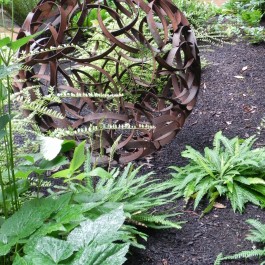
This rusted steel sphere represents the metal element in this garden designed by Vanessa Nagel, APLD
The element of Wood is naturally occurring in most gardens where there are trees and signs of life. There are some other items that you could incorporate into the design however. Some of these could include wooden furniture, a charming decorative wooden gate, or a well-designed wooden carving. The colors of wood are green, blue, and grey.
The element of water is representative of vitality and of the energy that is Feng Shui. Moving water is much preferred over stagnant water, as moving water demonstrates the constant flow of positive healing energy. Stagnant water on the other hand is not going anywhere, and it can become an unhealthy aspect of your garden. With this in mind, you’ll realize that a flowing pond, waterfall, or a fountain feature can add that tranquil feeling that your garden has been missing. Water has incredibly healing qualities, and simply spending time around your garden’s water feature will instill a sense of calm.
The element of Fire can be one of the most vibrant and dramatic aspects of your garden. You could certainly include a beautiful fire pit into your design, but it can also be incorporated with the use of bright orange and red hues. Flowers and design features that are orange and red can add a nice splash of color in an otherwise subtle Feng Shui space.
When your garden is designed following the principles of Feng Shui you’ll find that it isn’t just a beautiful and tranquil retreat, but you’ll find that simply spending time in the garden fills you with an abundance of energy.
Organized under Design Style, Landscape Design. Labeled as Garden Design, landscape design.
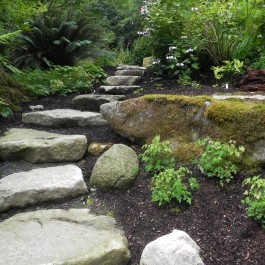
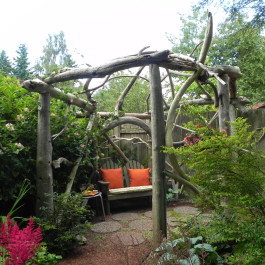
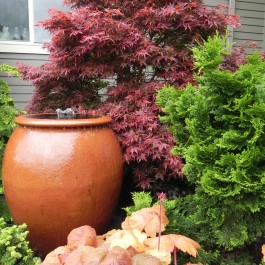
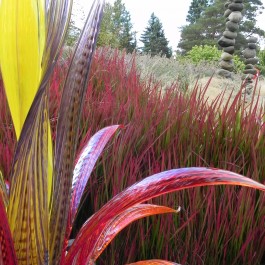


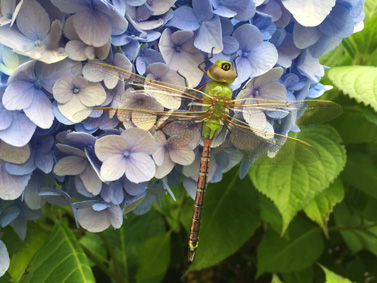
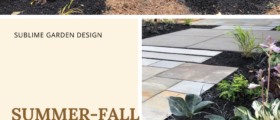
2 comments... (add a comment)